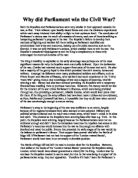Why did Parliament win the Civil War?
The Civil War broke out in 1642, when Charles I raised his royal standard in Nottingham. The Civil War was not a long continuous war, Armies lacked mobility and this meant that the time taken to collect basic equipment was often long and there were periods where no fighting took place. There were many factors that enabled Parliament to win the Civil War, their leadership was organised, they had support from more compact areas that were economically advance and had superior resources and the organisation of their military and finances also were improved. However, these factors were not at all sufficient to enable Parliament to win the Civil War until the Battle of Naseby and the re-emergence of neutralism.
One of the main problems that both side faced at the start of war was how to build an Army efficiently and both Parliament and the King had different conceptions on how the country should be organised for war. Charles built his war effort around local aristocrats with regional power and Parliament was more impersonal and arbitrary, using its legislative power to create a tax-collecting bureaucracy supporting, eventually a professional standing army.
The King’s war effort began in 1642, with the Commissions of Array, whereby wealthy local gentlemen were ordered to raise their counties’ forces for the King; this wasn’t the most organised strategy and by 1643 a more systematic organisation emerged. Committees were formed in each county, made from wealthy gentlemen, and were given the task of raising money and recruiting soldiers. The collection of taxes was a problem for the Royalists as the King relied on local men to raise them - they expected the money to be spent on local defence, there was no proper accounting of the money and being local men they were prepared to let their friends off. The problems which had undermined Charles’ military system throughout his reign therefore, resurfaced, made worse by the fact that Parliament disputed his control of these localities. It was only late on in the war that the Royalists realised a less traditional approach was needed, when the numbers of men in the Royalist Army was decreasing due to desertion, disease and casualties of war and so, in 1644 the Oxford Parliament passes a bill legalising conscription, along with an excise tax on basic commodities. However, by this time Parliament had been collecting its own excise for a whole year. The Royalists should have had an immediate advantage over the Parliament, with clear command and structure. However, Charles’ Armies were thwarted with personal rivalries, confused command structures and wounded pride. By the time the King realised fighting Parliament by traditional means was fatally flawed, a more ruthless system of collecting tax did emerge but by this time Parliament was already ahead of the game.







